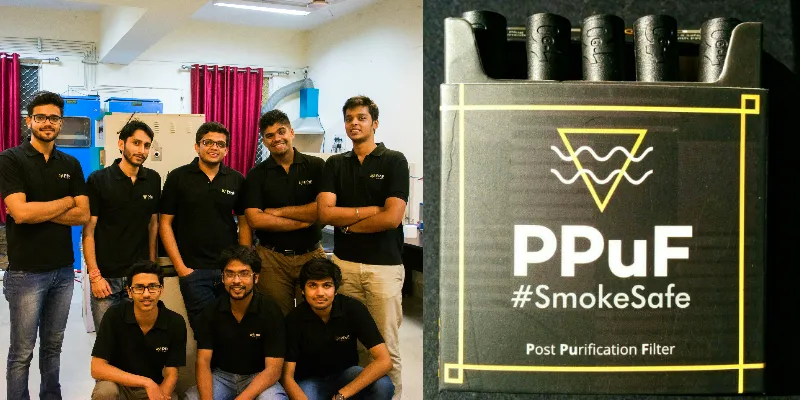IITians accidentally develop cigarette filter preventing 50pc chemicals from entering smokers’ mouths
While Delhi-NCR writhes helplessly in that thick blanket of smog, an IITian has found a way to make the cigarette smoke people voluntarily inhale almost chemical-free. A nanotech enthusiast determined to harness the technology for the welfare of mankind stumbled upon the invention of a filter that smokers could use to restrict the entry of nearly 50 percent of the harmful chemicals, without any compromise on the experience.

Not so nano a dream
Akshay Singhal had been doing research in nanotechnology since his second year as an undergraduate at IIT-Roorkee and decided to start the commercial production of high-quality graphene nanomaterials in India due to their scarce availability at the time.
“I was always driven by research which leads to immediate applications useful for mankind, and this is only possible with my own venture wherein I would be independent to take up new avenues of R&D and fund them by commercialisation of products developed,” says the 23-year old who stayed back as a PhD. student.
He began with extensive research on graphene-based air and water filtration technologies and simultaneously, in his first year, established Log9Materials with his parents Vivek Kumar Singhal and Shalini Singhal, and batchmate Vijayesh Kumar, and his parents - . This nanotech product development and materials manufacturing company would be the umbrella under which their research would be commercialised.
Vivek (48) has more than 25 years of experience in running small-scale ventures and handling the manufacturing workforce. Shalini (42) is a postgraduate in chemistry.
The PPuF that will blow your mind
Four months after their incorporation in April 2015, Log9Materials received pre-seed funding of Rs 15 lakh from TIDES, IIT Roorkee’s incubation centre. The funds were to be used to create technologies that can be launched as B2C products or licensed out to corporates. PPuF was an accidental offshoot of their air and water filtration R&D work. “One day after watching the statutory warning ads regarding smoking before a movie, I tried to use the filtration materials we have developed for air filtration for a cigarette and obtained overwhelming results, which gave birth to the idea of PPuF,” Akshay recalls. They then began to validate the viability of such a product in their network.
The product is a nanocomposite-based plug-on filter for cigarettes, selectively straining out up to 50 percent toxins like tar and ammonia present in the smoke, without affecting the “user experience” at all. The filter, priced at Rs 30, is reusable and can be used for up to five cigarettes, making it economical. Apart from the obvious health benefits of filtering out cancer-causing toxins, the product also prevents the consumer from side effects like cough, colouring of teeth, bad smell, etc. “We focused a lot on user experience, particularly the taste and the overall feel,” says Akshay.
Overwhelmed by the demands of the business, Vijayesh soon left Log9. He was replaced by another undergrad student at IIT Roorkee, who contributed six months of unmatched work on the product design and development of PPuF and bowed out. These were trying times for Akshay, but the entry of Kartik Hajela, a final-year chemical engineering student at IIT Roorkee, finally completed the team.
Initial hiccups
Akshay notes that while the numerous campaigns stating the hazards associated with cigarette smoking have made people more health-conscious, getting consumers to pay for products that reduce these hazards has not been easy. However, Akshay takes this in his stride, stating that such challenges are typical to any unique product which enters a totally new market.
Starting this October, PPuF was made available with cigarette vendors in Gurgaon. At first it was available mainly near corporate offices, but within a week, demand had exceeded supply, a great problem for the young team to have. So far they have sold 600 packs, each containing five filters, through about 10–12 retailers in Gurgaon in and around DLF Cyber Hub, and also through some retailers in Roorkee. “We expect to sell 10,000 packs of five filters each in the next three months owing to rising demand and awareness." At full capacity, they manufacture 1,000 packs a day, but are hoping that to expand this capacity to 10,000 packs a day within six months.
To attain this desired scale, apart from the pre-seed investment they received early on, they are looking for additional investment from venture firms and networks.
By building vendor relationships and investing in innovative packaging to make their product stand apart, they want to compete with the fakes they are anticipating will enter the market.
Zooming out
Being a startup whose vision is to roll out commercial applications of nanotechnology, the market and competitive ecosystem varies for the different products they are working on. For their initial product — PPuF — BMJ Global Health has touted the market of smokers at $108 million as of 2015. Even as alternatives like e-cigarettes are slowly finding space in the market, they haven’t found large-scale adoption due to a drastically altered user experience.
“Thus, a control measure is needed to target the harmful effects of smoking without affecting user experience, which is what our product does. So, we can take on the health-conscious segment of smokers,” explains Akshay.
As hookahs are supposedly more harmful than cigarettes, they are also looking to make a different variant of the product available to cater to hookahs and sheeshas, and will likely enter the Middle East with it. In the short term, they will be expanding to all of Delhi-NCR and within three months, to other Tier-1 metro cities. Apart from filtration, they have also carried out preliminary work on various protective coatings and graphene quantum dot-based LED displays.
www.log9materials.com







